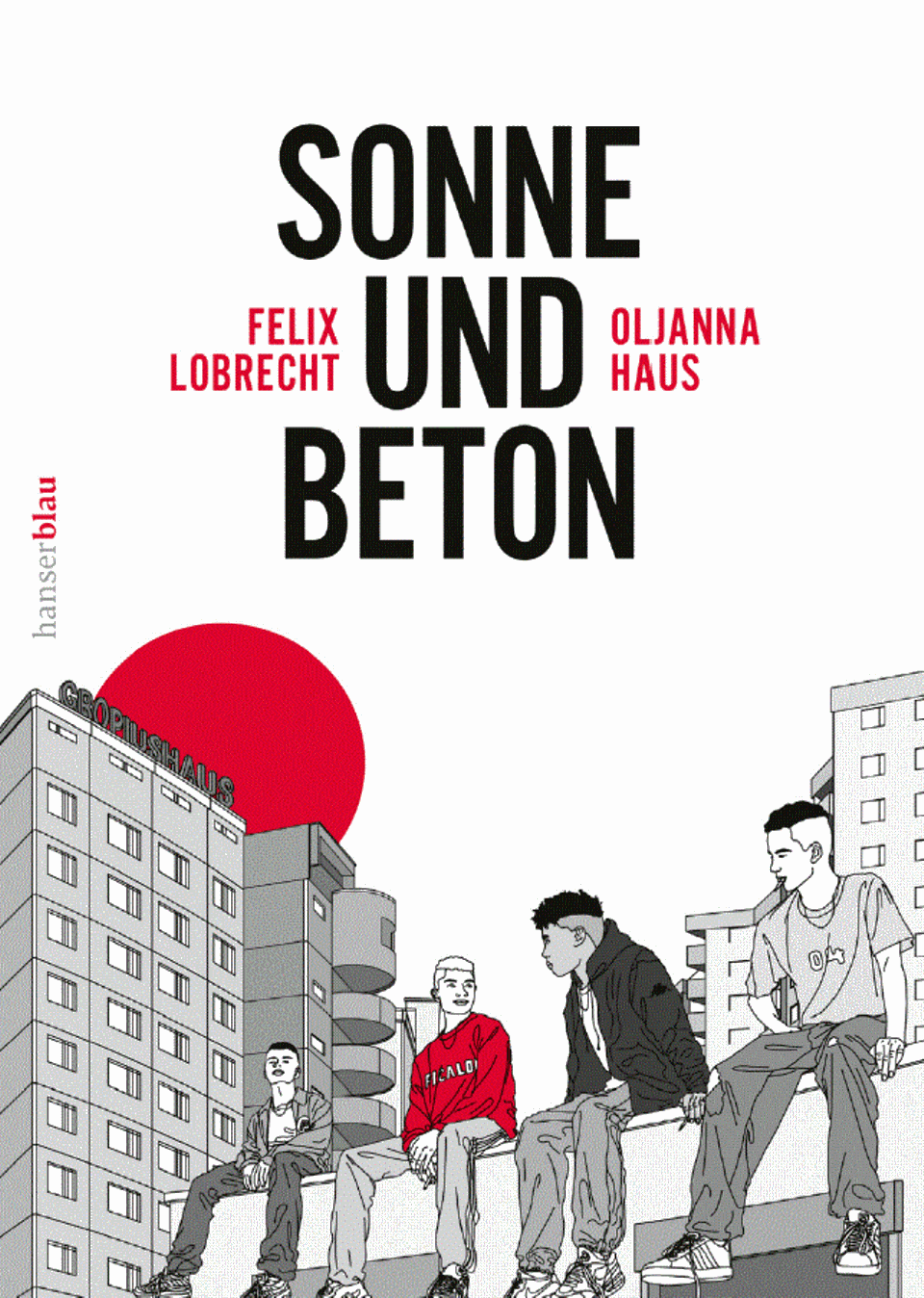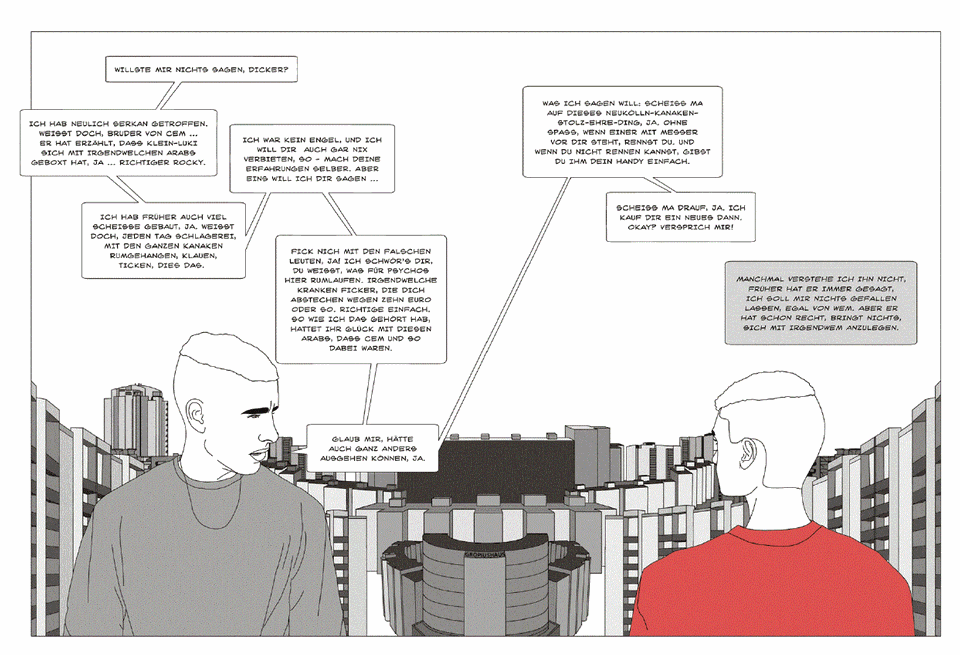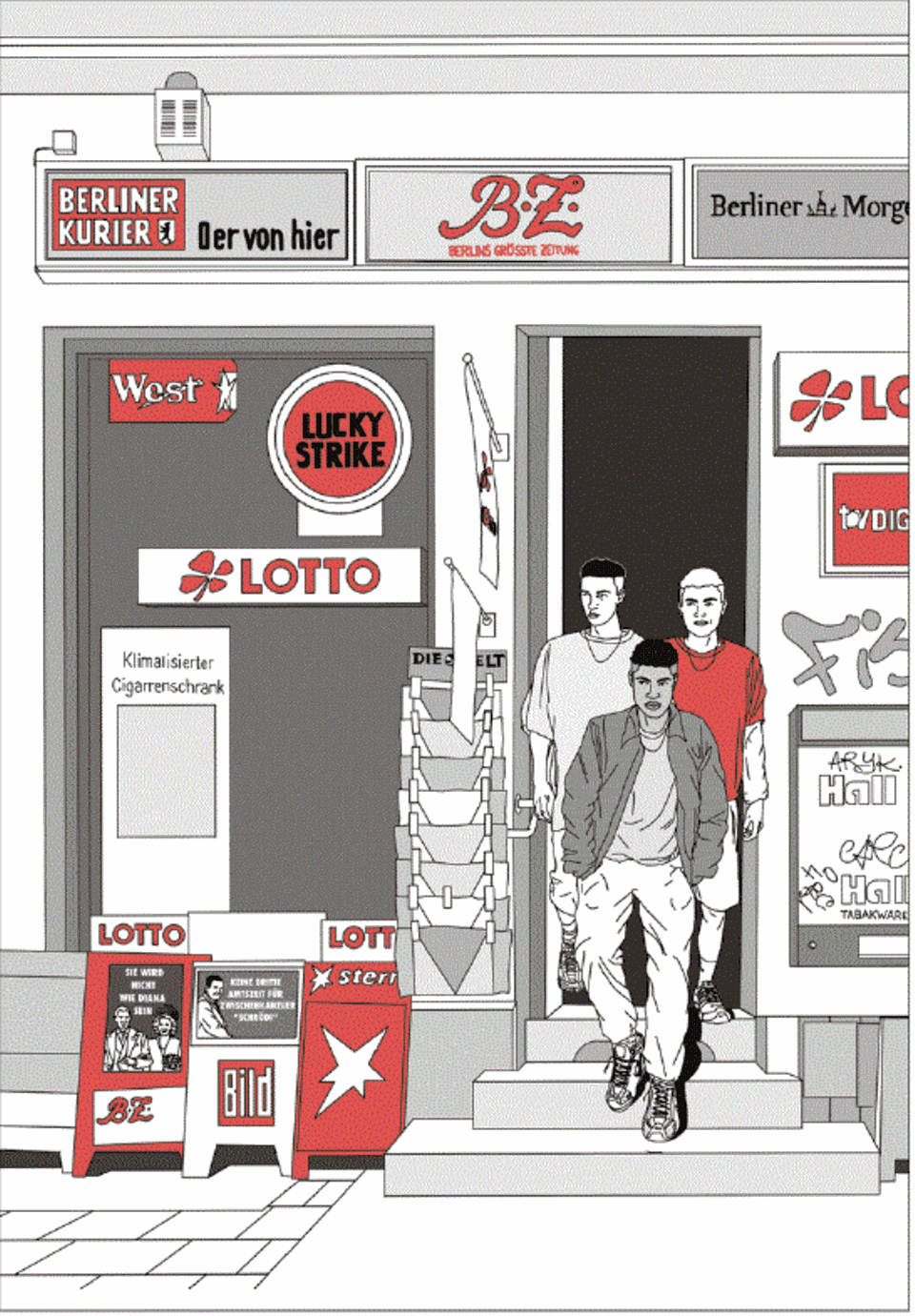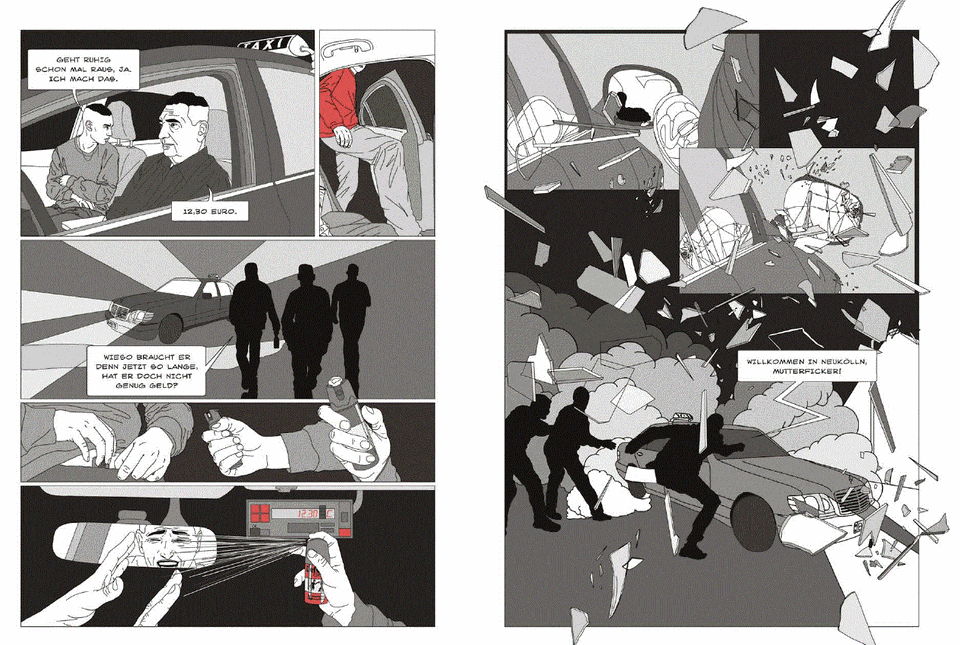Felix Lobrecht and the illustrator Oljanna Haus made a graphic novel out of his debut novel “Sun and Concrete”. In the interview, the two talk about Neukölln, opportunities, rough language and boring school readings.
Two brothers are smoking on a balcony and looking into the gray concrete desert of a Neukölln high-rise estate: “Believe me, it could have turned out differently,” one says to the other.
And yes, it would have. Also for Felix Lobrecht, in whose new graphic novel this scene can be found. But as it happened, Lobrecht is one of the most successful comedy stars in Germany today. In his fictional bestseller novel “Sun and Concrete”, the man from Neukölln described three years ago what he experienced in his youth in Berlin’s Gropiusstadt.

The graphic novel “Sun and Concrete” by Felix Lobrecht and Oljanna Neuhaus is published by Verlag Hanserblau.
© Hanserblau
This novel is now available as a Graphic novel, drawn from the 23 year old Oljanna house. Actually, she is training to be a carpenter, but in the first lockdown she began to draw individual scenes of the novel out of boredom and posted them on Twitter. Felix Lobrecht saw the pictures and wrote to them. An entire book emerged from this news. This shows pictures of young people in Picaldi jeans, of subway station posters advertising the new “The Dome Summer” CD and of newspaper front pages that discuss Schröder’s current term of office at the kiosk: It’s the noughties and a group of boys in the middle dragging crates of beer through gray canyons, getting drunk at bus stops and breaking into their own school.
It is a book about the loneliness and mistakes of youth. Although the N-word and right-wing slogans are shouted, the graphic novel is already being read in many schools in Germany – with the star spoke author and illustrator about a gray-drawn Neukölln and boring school readings.

Scenes from “Sun and Concrete”: Conversations over the roofs of high-rise canyons …
© Hanserblau
Oljanna Haus, you drew your first graphic novel. With “Sonne und Beton” (Sun and Concrete), the original was directly a bestseller novel. Weren’t you afraid of failure when Felix wrote to you on Twitter?
Oljanna Haus: I was so happy when Felix wrote to me that I would probably have just said yes to everything. I’m actually doing vocational training as a carpenter in Bieberach in Baden-Württemberg and didn’t have time for that. I just had to leave a school lesson for this telephone interview as well. But in the first lockdown I was bored and just started drawing. When it was certain that it was going to be a whole graphic novel, I drew late into the night after my online courses. Even when my friends went out to celebrate, I kept drawing until early in the morning on weekends. In the end, it was my naivety that I didn’t know what work was about to help me.
Felix Lobrecht: It was the same for me three years ago when I wrote the novel “Sun and Concrete”. With your first book, you don’t know how much work you have to do. Back then I just kept writing. Now I’m working on my second book and I have writer’s block because I know how much work I have to do. I’m not an author in the classic sense – just someone who once wrote a book. Anyone who has ever stood on a stage is not a comedian for me either.
Felix Lobrecht, do you like to shake hands with people who are still inexperienced?
Felix Lobrecht: That’s a basic hip-hop idea: get yourself up and then your team. I saw Oljanna’s drawings and immediately knew – something has to be done with them. I didn’t need any further references. I saw that she has mastered her craft. Paying attention to references is a system that requires itself anyway. Everyone has to start with something. The young comedians I have under contract with me were also on the small stages of Berlin for years. They already had a lot of experience, but the problem was: Nobody knew them. Oljanna wasn’t inexperienced, just unknown – that’s different now.
The graphic novel tells a fictional story, but is about the streets of Neukölln where you grew up. In the past, would you have wished that someone would shake hands with you and give you a chance, as you did at Oljanna Haus?
Felix Lobrecht: Yes, I often wished for something like that on my way. I am the oldest of my siblings. At times in my life I would have liked to have had a big brother who could explain things to me. At university, for example, I initially had a lecturer who I thought was cool and who liked me. She pulled me along and showed me a way. But then she quit due to illness, although I needed her as a mentor. If she hadn’t stopped, I might have turned out to be really good at university. The guys our graphic novel is about didn’t need a person to help them on the streets of Neukölln. They have their friends. Rather, these guys, like me in my youth, would have needed a social structure in order not to go off the beaten track. They are victims of their social circumstances. They needed a Germany that would take care of them.

… the youth in Neukölln in the noughties …
© Hanserblau
Oljanna Haus, how did you find access to this Neukölln world in order to draw you?
Oljanna Haus: I grew up completely differently in southern Germany. Nevertheless, I got to know this world through friends who grew up similarly to Felix and the boys in “Sun and Concrete”. When I was drawing Neukölln, I was on Google Maps a lot. During the lockdown, I was able to watch the figures on the way to school through the high-rise buildings in Neukölln’s Gropiusstadt. When it was possible to travel again, I went there myself and walked through the neighborhood.
Felix Lobrecht: A district like Gropiusstadt doesn’t only exist in Berlin – there is such a settlement in every German city.
Felix Lobrecht, how did you feel when you saw the pictures of the finished graphic novel for the first time?
Felix Lobrecht: It was really crazy to see the places of my childhood in a graphic novel. Oljanna drew them with great attention to detail. But it didn’t cause a bad feeling. I finished my youth when I was in my early 30s and I’m at peace with it. Today I live at Kottbusser Tor in Kreuzberg. Compared to Gropiusstadt, that might even be a downgrade. Sure, I could buy my own house, but I think: It keeps me going to live here.
Oljanna Haus, the style of the graphic novel lives from the beautiful facial features of the characters and the many gray areas of the city blocks: Has that always been the style in which you drew?
Oljanna Haus: No, this style was created while I was drawing. The gray tones in which the pictures are designed came later. In my next book I will refrain from doing this because all the grayness may then no longer fit. But it went well with the Neukölln district. It’s the dreary part of the neighborhood that looks so gray.
Felix Lobrecht: The style is an extension of the architecture of Gropiusstadt. Clear edges and little color. But it is interesting that all people notice the beautiful faces.
Oljanna Haus: (laughs) Yes, that’s right, they stand out.
Felix Lobrecht, what can a graphic novel express that your novel three years ago couldn’t?
Felix Lobrecht: This graphic novel makes my novel more compact. All descriptive elements are omitted and are now processed in images. What is left are only the characters’ dialogues. Many young students read my book because they can identify with these characters. The graphic novel is a low-threshold entry point for many who do not enjoy reading. However, no book replacement.
The language of these dialogues is very harsh. The N-word and K-word fall a few times. Nazi slogans are also in the dialogues without comment. Is this primarily a book about teenagers or for teenagers?
Felix Lobrecht: Neither. I wasn’t concerned about who should read this book when I wrote it. The language shows that many young people feel that they have been picked up. I didn’t make up this language to be gross. Authenticity works through language. It was never an issue that I should take these ugly words out. I can’t write a book about Neukölln and then falsify the language. The guys on the street keep talking anyway, no matter what words I write in my book or not. To make Neukölln politically correct would be complete nonsense. This book should never have a didactic claim. But many teachers from problematic German districts write to me that my book is their class reading.
Oljanna Haus: The language is really crazy. Personally, I don’t talk like that, but I know enough people who talk like that. It’s ok to portray it that way.

… and an everyday life that is characterized, among other things, by the interplay between boredom, lack of perspective and violence.
© Hanserblau
What does it do to you that your book will likely be read in many schools in the near future?
Oljanna Haus: Just last week a teacher wrote to me that she had read my book with her tenth grade. She invited me to come into her class to talk to the class about the graphic novel. It was an absurd feeling: “A few years ago I was still in school myself,” I thought to myself at that moment. Maybe I would have wished for a book like this earlier in my school days.
How did you feel about reading school during your school days?
Felix Lobrecht: I hated everything that had to do with school – including reading at school. For me from a certain grade onwards, that was just amusement. I was there because I had to go. I think school literature often seems out of date for many students. Even at a third glance it is not clear what a 15 year old boy in the 21st century has to do with ‘The Sorrows of Young Werther’. I think it needs more mixing. In fifth grade we had to read ‘Die Kinder vom Bahnhof Zoo’. That was much too early for many in my class, after all we grew up not far from this place. Nevertheless, this book has brought me more than many other shit books.
There are few female characters in the book. Does this make a book for guys?
Oljanna Haus: I only noticed that very late when I drew the first female figure halfway through the book. But that didn’t bother me. Guys that age don’t hang out with girls very often.
Felix Lobrecht: I didn’t want to write from the perspective of a 15 year old woman. That would have been artificial. But I would like to read such a problem district story from the perspective of a woman.
This article contains so-called affiliate links. Further information are available here.

In the video: Angela Merkel ruled Germany for 16 years – and now? Problems such as the distribution of wealth and assets or the global climate crisis remain unsolved. Who should solve our problems in the future? And should the voting age be lowered to 14 years? The DISKUTHEK invites young politicians to an exchange of blows.

